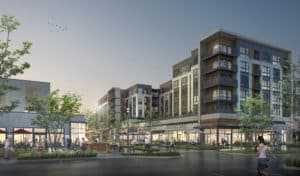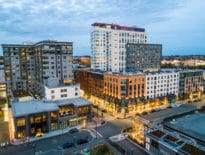
Woburn officials in June approved developer Edens’ plans for a 350-unit apartment complex as the Woburn Mall is redeveloped into a mixed-use center known as Woburn Village. Image courtesy of Edens
Is the “retail apocalypse” coming to a shopping mall near you?
Based on recent headlines, it would seem imminent. Earlier this month, the now-defunct Swansea Mall was auctioned off. The struggling Woburn Mall is in the process of being “de-malled.” In Western Massachusetts, cannabis cultivators are eying anchor spaces at the Eastfield Mall and Berkshire Mall to open growing and retail operations.
Other area malls are either undergoing or contemplating major changes in their tenant mixes as they try to adapt to increasing competition from e-retailers and increasing demand from consumers for more “lifestyle” amenities, such as restaurants, theaters, fitness clubs and even housing.
“We’re in the middle of a huge evolution and transformation in retail,” said Matt Curtin, a senior vice president at CBRE in Boston.
Bob Sheehan, vice president of research at KeyPoint Partners, said a once-derided Credit Suisse report, which two years ago predicted that up to 25 percent of the nation’s shopping malls would close by 2022, “no longer looks unreasonable” due to major retailers declaring bankruptcies and closing stores on a massive scale, as seen irecent moves by Sears and Payless ShoeSource.
But Curtin, Sheehan and other retail real-estate players say not all shopping malls will go the way of the proverbial dodo bird.
They note that class A malls, in more affluent and densely populated areas, should survive and could even thrive, if they make the right changes to their tenant and business mixes. Meanwhile, many retailers are moving to urban settings and small downtown main streets to be closer to where people work, live and congregate.
“Retail is not dead,” says Adam Conviser, founder and principal of Conviser Property Group. “It’s just re-shifting. It’s changing.”

The market for urban retail space is staying strong in Eastern Massachusetts as national retailers push into more densely populated centers, such Boston’s Newbury Street and Seaport.
An Unheralded Retail Recovery in Eastern Mass.
A recent report by KeyPoint Partners, a Burlington-based commercial real estate services company in Burlington, noted the total amount of retail inventory in eastern Massachusetts actually increased last year to 196.3 million square feet, up a “significant” 1 percent from 2017 and dispelling the widespread perception of retail retrenchment.
So, what’s going on? Some developers are actually building new retail space within mixed-used developments, such as at the former Raytheon site on Route 20 in Sudbury, where National Development and AvalonBay Communities have built new space for restaurants and stores, such as a new Whole Foods Market, and housing.
CBRE’s Curtin, who specializes in retail, said the urban market has “never been busier,” as retailers push into more densely populated centers, such as Outdoor Voices’ recent move into Boston’s Seaport District and footwear specialist Allbirds into the Back Bay.
Class A shopping malls, meanwhile, are busy repositioning themselves, such as the Burlington Mall, where owner Simon Property Group plans to turn a former Sears store into restaurants and smaller shops, while transforming a separate Sears Tire and Battery center into commercial space.
Radical Approach Needed at Lower-Tier Properties
While class A properties tweak and experiment with their tenant mix, the situation at class B and class C shopping malls, usually located in less–affluent and less–populated areas, is more dire – and require more radical solutions.
The Swansea Mall was closed in March due to loss of tenants, and its owner, the Carlyle Group, is scheduled to put the 418,000-square-foot complex up for auction online by the end of April.
Meanwhile, Taunton’s 1.1 million-square-foot Silver City Galleria, which has lost all four of its anchor tenants (including Sears last year), is “now a shell of its former self,” as WPRI recently described it. Last year, the owner of the enclosed mall, MGHerring Group, was talking of possible “alternative uses” at the site, such as housing, a hotel, and medical and commercial offices, according to published reports.
The Woburn Mall is on track to being “de-malled,” as the owner, Edens LLC, pushes ahead with redevelopment of the site into a full mixed-use complex that will include retail, restaurants, movie theater and 400 apartments.
Robert Buckley, an attorney specializing in retail at Riemer Braunstein LLP, said some malls, especially class B and C, simply have to adapt to changing times, or perish.
“They have to reinvent themselves,” he said, “and that’s what many of them are doing.”
Rob Robledo, a senior vice president at CBRE, said he sees the current turmoil within the retail sector eventually ebbing in coming years, as retailers find new homes and landlords reposition properties, sometimes radically so.
“Once all the shakeout occurs, things will settle down,” he said.
Email: jayfitzmedia@gmail.com




 |
| 

